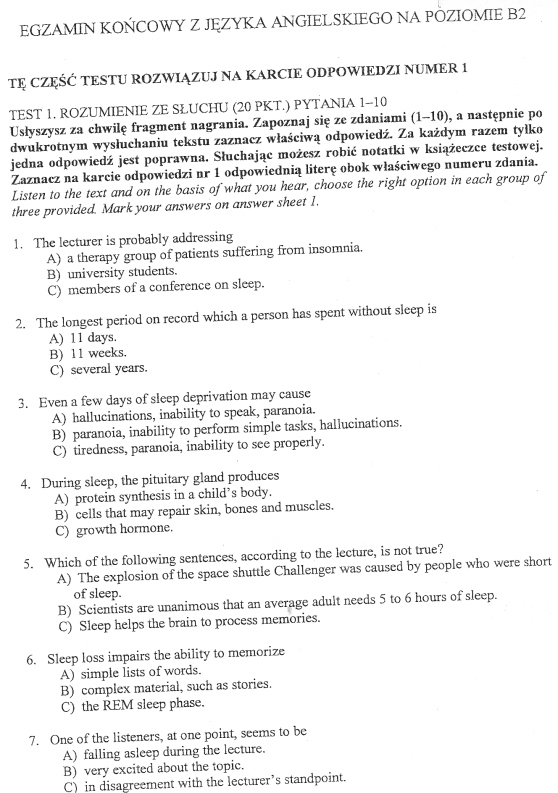angB02

EGZAMIN KOŃCOWY Z JĘZYKA ANGIELSKIEGO NA POZIOMIE B2
TĘ CZĘŚĆ TESTU ROZWIĄZUJ NA KARCIE ODPOWIEDZI NUMER 1 TEST 1. ROZUMIENIE ZE SŁUCHU (20 PKT.) PYTANIA 1-10
Usłyszysz za chwilę fragment nagrania. Zapoznaj się ze zdaniami (1-10), a następnie po dwukrotnym wysłuchaniu tekstu zaznacz właściwa odpowiedź. Za każdym razem tylko jedna odpowiedź jest poprawna. Słuchając możesz robić notatki w książeczce testowej. Zaznacz na karcie odpowiedzi nr 1 odpowiednią literę obok właściwego numeru zdania.
Lis ten to the text and on the basis ofwhat you hear, choose the right option in each group of three provided Mark your answers on answer sheet 1.
1. The lecturer is probably addressing
A) a therapy group of patients suffering from insomnia.
B) university students.
C) members of a conference on sleep.
2. The longest period on record which a person has spent without sleep is
A) 11 days.
B) 11 weeks.
C) several years.
3. Even a few days of sleep deprivation may causc
A) hallucinations, inability to speak, paranoia.
B) paranoia, inability to perform simple tasks, hallucinations.
C) tiredness, paranoia, inability to sce properly.
4. During sleep, the pituitary gland produces
A) protein synthesis in a child’s body.
B) cells that may repair skin, bones and muscles.
C) growth hormone.
5. Which of the following sentences, according to the lccture, is not true?
A) The explosion of the space shuttie Challenger was caused by people who were short of sleep.
B) Scientists are unanimous that an avcrage adult needs 5 to 6 hours of sleep.
C) Sleep helps the brain to process memories.
6. Sleep loss impairs the ability to memorize
A) simple lists of words.
B) complex materiał, such as stories.
C) the REM sleep phase.
7. One of the listeners, at one point, seems to be
A) falling asleep during the lecture.
B) very excited about the topie.
C) in disagreement with the lecturer’s standpoint.
Wyszukiwarka
Podobne podstrony:
img080 (40) EGZAMIN KOŃCOWY Z JĘZYKA ANGIELSKIEGO NA POZIOMIE B2 TĘ CZĘŚĆ TESTU ROZWIĄZUJ NA KARCIE
Scan1 (23) EGZAMIN KOŃCOWY z JĘZYKA ANGIELSKIEGO na POZIOMIE B2 ♦ Odpowiedzi na py
new 1 2 EGZAMIN KOŃCOWY Z JĘZYKA ANGIELSKIEGO NA POZIOMIE 152 • Odpowiedzi na pyta
new 2 (5) EGZAMIN KOŃCOWY Z JĘZYKA ANGIELSKIEGO NA POZIOMIE B2TĘ CZĘŚĆ TESTU ROZWIĄZUJ NA KARCIE ODP
new 11 (3) EGZAMIN KOŃCOWY Z JĘZYKA ANGIELSKIEGO - POZIOM B2 (Sesja wrześniowa 2006) KLUCZ DO ODPOWI
59430 new 12 2 EGZAMIN KOŃCOWY Z JĘZYKA ANGIELSKIEGO - POZIOM B2 (Sesja wrześniowa 2006) KLUCZ DO OD
- egzaminu pisemnego z języka angielskiego na poziomie Cl, z trzech części -
więcej podobnych podstron